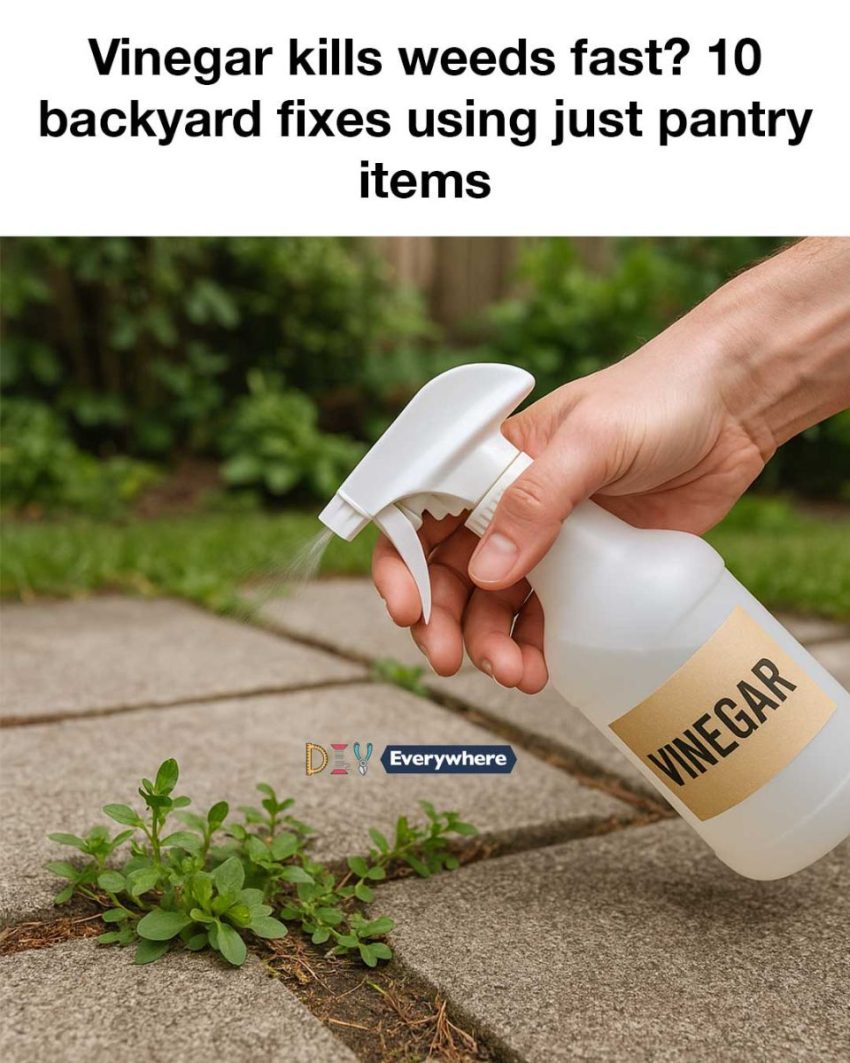ADVERTISEMENT
2. Baking Soda for Ant Control
Baking soda is a simple yet effective solution for controlling ants in your backyard. The abrasive nature of baking soda disrupts the ants’ exoskeletons, while its alkaline properties interfere with their digestive systems. To use baking soda as an ant deterrent, mix equal parts of baking soda and powdered sugar. The sugar attracts the ants, while the baking soda eliminates them.
Sprinkle the mixture around ant trails and near entry points to your home. Reapply after rain or watering to maintain its effectiveness. This method is safe for pets and children, making it an ideal choice for family-friendly pest control.
3. Salt as a Weed Barrier
Salt is another pantry item that can be used to prevent weeds from taking over your garden. It works by dehydrating plants and preventing them from absorbing essential nutrients. To create a salt barrier, dissolve 1 cup of salt in 2 cups of hot water. Pour the solution directly onto the soil where you want to prevent weed growth.
Be cautious when using salt, as it can also harm desirable plants and alter soil composition. It’s best used in areas where you don’t plan to grow anything, such as driveways or walkways. Always rinse the area with water after application to minimize the impact on surrounding soil.
4. Coffee Grounds to Enrich Soil
Used coffee grounds are a fantastic way to enrich your garden soil. They are rich in nitrogen, which is essential for plant growth. Simply sprinkle the coffee grounds around the base of your plants or mix them into your compost pile. This will help improve soil structure and increase nutrient availability.
Coffee grounds also attract earthworms, which are beneficial for soil aeration and nutrient cycling. Additionally, they can deter pests like slugs and snails, making them a versatile addition to your gardening routine. Just be sure not to overdo it, as too much coffee can increase soil acidity.
5. Dish Soap for Aphid Removal
Aphids can wreak havoc on your plants, but dish soap offers a simple solution. The soap breaks down the protective outer layer of aphids, causing them to dehydrate and die. To make an aphid spray, mix 1 tablespoon of dish soap with 1 quart of water in a spray bottle. Apply the solution directly to the affected plants, ensuring thorough coverage.
Repeat the application every few days until the aphids are gone. This method is safe for most plants, but it’s always a good idea to test a small area first to ensure there’s no adverse reaction. Avoid using dish soap with added fragrances or dyes, as these can harm plants.
6. Cornmeal to Prevent Weeds
Cornmeal is a natural pre-emergent herbicide, meaning it prevents weed seeds from germinating. To use cornmeal as a weed deterrent, sprinkle a thin layer over the soil in early spring before weeds have a chance to sprout. The gluten in cornmeal inhibits seed growth, reducing the number of weeds in your garden.
This method is particularly effective for annual weeds, but it won’t affect established plants. Cornmeal is safe for use around existing plants and won’t harm beneficial insects, making it an eco-friendly choice for weed prevention.
7. Epsom Salt for Plant Growth
Epsom salt is a gardener’s secret weapon for promoting plant growth. It contains magnesium and sulfur, which are vital nutrients for plants. To give your plants a boost, dissolve 1 tablespoon of Epsom salt in 1 gallon of water and use it to water your plants once a month.
Tomatoes, peppers, and roses, in particular, benefit from Epsom salt, as it helps improve flower blooming and enhances fruit production. Be careful not to overapply, as too much magnesium can lead to nutrient imbalances in the soil.
8. Lemon Juice to Deter Pests
Lemon juice is a natural pest deterrent due to its high acidity and strong scent. To keep pests like ants and spiders at bay, mix equal parts lemon juice and water in a spray bottle. Apply the solution around the perimeter of your garden or home, focusing on entry points and areas where pests are common.
The scent of lemon is unpleasant to many insects, and the acidity can disrupt their trails. Reapply after rain or watering to maintain its effectiveness. Lemon juice is safe for plants and pets, making it a great natural alternative to chemical pesticides.
9. Cinnamon to Prevent Fungus
Cinnamon is a natural antifungal agent that can help prevent and treat fungal infections in plants. To use cinnamon as a fungicide, sprinkle a light dusting over the soil surface or directly onto affected plants. This will help inhibit the growth of fungi and protect your plants from diseases like damping-off.
Cinnamon is particularly useful for seedlings, as they are more susceptible to fungal infections. It’s a safe and non-toxic option that won’t harm beneficial insects or alter soil chemistry. Use it as a preventative measure or at the first sign of fungal issues.
10. Olive Oil for Tool Maintenance
Olive oil is not just for cooking; it can also be used to maintain your gardening tools. The oil helps prevent rust and keeps tools in good working condition. To clean and protect your tools, wipe them down with a cloth soaked in olive oil after each use.
For tools with wooden handles, olive oil can also help condition the wood, preventing it from drying out and cracking. Simply rub a small amount of oil into the handle and wipe off any excess. Regular maintenance with olive oil will extend the life of your tools and ensure they remain effective.
11. Vodka as a Weed Killer
Vodka can be used as an alternative weed killer, particularly for sunny areas. The alcohol in vodka dehydrates weeds, causing them to wither and die. To make a vodka weed spray, mix 1 ounce of vodka with 2 cups of water and a few drops of dish soap in a spray bottle. Apply the solution directly to the leaves of the weeds on a sunny day.
The dish soap helps the vodka adhere to the leaves, while the sun enhances the drying effect. As with vinegar, be careful to avoid spraying desirable plants, as vodka is non-selective and can harm any vegetation it contacts.


